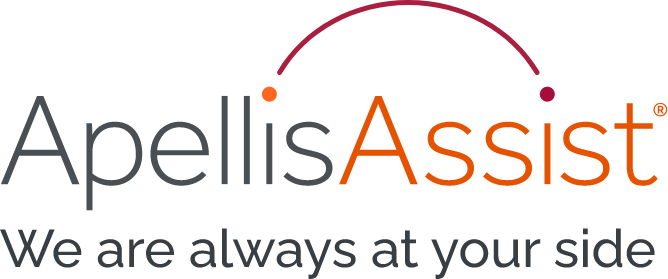
Financial assistance
(for those who are eligible)

Andrea is an
adult who's taken
EMPAVELI.
EMPAVELI is a medicine that affects your immune system and may lower the ability of your immune system to fight infections.
EMPAVELI increases your chance of getting serious infections caused by encapsulated bacteria such as Streptococcus pneumoniae, Neisseria meningitidis, and Haemophilus influenzae type B. These serious infections may quickly become life-threatening or cause death if not recognized and treated early.
Your healthcare provider will give you a Patient Safety Card about the risk of serious infections. Carry it with you at all times during treatment and for 2 months after your last EMPAVELI dose. Your risk of serious infections may continue for several weeks after your last dose of EMPAVELI. It is important to show this card to any healthcare provider who treats you. This will help them diagnose and treat you quickly.
EMPAVELI is only available through a program called the EMPAVELI Risk Evaluation and Mitigation Strategy (REMS). Before you can take EMPAVELI, your healthcare provider must enroll in the EMPAVELI REMS program, counsel you about the risk of serious infections caused by certain bacteria, give you information about the symptoms of serious infections, make sure that you are vaccinated against serious infections caused by encapsulated bacteria and that you receive antibiotics if you need to start EMPAVELI right away and you are not up to date on your vaccines, and give you a Patient Safety Card about your risk of serious infections.
Do not take EMPAVELI if you:
Before you take EMPAVELI, tell your healthcare provider about all of your medical conditions, including if you:
Tell your healthcare provider about all the vaccines you receive and medicines you take, including prescription and over-the-counter medicines, vitamins, and herbal supplements which could affect your treatment.
If you stop taking EMPAVELI, your healthcare provider will need to monitor you closely for at least 8 weeks after stopping EMPAVELI. Stopping treatment with EMPAVELI may cause a breakdown of red blood cells due to PNH.
Symptoms or problems that can happen due to red blood cell breakdown include:
EMPAVELI can cause serious side effects including allergic reactions. Allergic reactions can happen during your EMPAVELI infusion. Stop your EMPAVELI infusion and tell your healthcare provider or get emergency medical care right away if you get any of these symptoms during your EMPAVELI infusion:
The most common side effects in people with PNH treated with EMPAVELI include injection-site reactions; infections; diarrhea; pain in the stomach (abdomen); respiratory tract infection; pain in the arms, hands, legs, or feet; low potassium in blood; tiredness; viral infection; cough; joint pain; dizziness; headache; and rash.
These are not all of the possible side effects of EMPAVELI. Tell your healthcare provider about any side effect that bothers you or that does not go away.
Call your healthcare provider for medical advice about side effects. You may report side effects to FDA at 1-800-FDA-1088 or www.fda.gov/medwatch.
EMPAVELI is a prescription medicine used to treat adults with a disease called paroxysmal nocturnal hemoglobinuria (PNH).
Please see full Prescribing Information, including Boxed WARNING regarding risk of serious infections, and Medication Guide for additional information.

It takes teamwork to help manage paroxysmal nocturnal hemoglobinuria (PNH). The ApellisAssist patient support program provides comprehensive support, with helpful resources and experienced people dedicated to making a difference for you.
With the program, you have access to:
Call the ApellisAssist team at
1-866-MY-APL-ASSIST (1-866-692-7527) from 8 AM-8 PM ET, MONDAY-FRIDAY
With EMPAVELI, you don’t have to go it alone. Learn about your dedicated partners from the ApellisAssist program.
Through our specialty pharmacy, PANTHERx Rare, a Care Coordinator will:
Your ACE is there for you from the start. They will provide you:
Care Coordinators and ACEs do not give medical advice. Talk to your doctor for treatment-related questions.

“My ACE is amazing. Her training helped give me confidence in self-administering EMPAVELI. She continues to be there for me and is always a phone call away.”
Emma is an adult with PNH who's taken EMPAVELI.
Individual experiences may vary.
See the Instructions for Use for information about how to prepare, infuse, and store your EMPAVELI. Your doctor should show you how to prepare and infuse EMPAVELI before you use it for the first time. Use EMPAVELI exactly as your doctor tells you. Your doctor will tell you how much and how often to infuse EMPAVELI. Do not infuse more or less than your doctor tells you to.
If you haven’t tried EMPAVELI yet, you may be eligible for the EMPAVELI Trial Offer regardless of insurance coverage or current treatment.
If you and your healthcare provider are ready to try EMPAVELI, you may be eligible to enroll in the Trial Offer program.
*Terms, conditions, and eligibility requirements apply. Ask your healthcare provider for more information.
Call an ApellisAssist representative at 1-866-MY-APL-ASSIST
(1-866-692-7527) to speak with your Care Coordinator
about your insurance benefits or the financial assistance programs below.
Apellis Co-Pay Program
The Apellis Co-Pay Program for patients with commercial insurance may be able to help cover your co-pay and co-insurance costs. Enroll in ApellisAssist today to see if you’re eligible for this program.†,‡
†The Apellis Co-Pay Program is for eligible patients who are enrolled in the ApellisAssist program, are commercially insured, and who are not covered under government insurance programs such as Medicaid, VA/DoD, or TRICARE.
‡Additional terms and conditions apply. Program terms are subject to change.
Apellis Patient Assistance Program
If you don’t have insurance or your insurance only provides limited coverage, the Apellis Patient Assistance Program may be able to help you obtain EMPAVELI at no cost.
To be eligible for the Apellis Patient Assistance Program, you must:
Additional terms and conditions apply. Program terms are subject to change.
Apellis Bridge Program
The Apellis Bridge Program can help with interruptions or changes in insurance. If your insurance provider has changed or your plan has changed, you may experience an interruption in coverage. If this occurs, you could be eligible for a temporary supply of EMPAVELI through the Apellis Bridge Program.§
§Terms and conditions apply. Program terms are subject to change.
EMPAVELI is a medicine that affects your immune system and may lower the ability of your immune system to fight infections.
EMPAVELI increases your chance of getting serious infections caused by encapsulated bacteria such as Streptococcus pneumoniae, Neisseria meningitidis, and Haemophilus influenzae type B. These serious infections may quickly become life-threatening or cause death if not recognized and treated early.
Your healthcare provider will give you a Patient Safety Card about the risk of serious infections. Carry it with you at all times during treatment and for 2 months after your last EMPAVELI dose. Your risk of serious infections may continue for several weeks after your last dose of EMPAVELI. It is important to show this card to any healthcare provider who treats you. This will help them diagnose and treat you quickly.
EMPAVELI is only available through a program called the EMPAVELI Risk Evaluation and Mitigation Strategy (REMS). Before you can take EMPAVELI, your healthcare provider must enroll in the EMPAVELI REMS program, counsel you about the risk of serious infections caused by certain bacteria, give you information about the symptoms of serious infections, make sure that you are vaccinated against serious infections caused by encapsulated bacteria and that you receive antibiotics if you need to start EMPAVELI right away and you are not up to date on your vaccines, and give you a Patient Safety Card about your risk of serious infections.
Do not take EMPAVELI if you:
Before you take EMPAVELI, tell your healthcare provider about all of your medical conditions, including if you:
Tell your healthcare provider about all the vaccines you receive and medicines you take, including prescription and over-the-counter medicines, vitamins, and herbal supplements which could affect your treatment.
If you stop taking EMPAVELI, your healthcare provider will need to monitor you closely for at least 8 weeks after stopping EMPAVELI. Stopping treatment with EMPAVELI may cause a breakdown of red blood cells due to PNH.
Symptoms or problems that can happen due to red blood cell breakdown include:
EMPAVELI can cause serious side effects including allergic reactions. Allergic reactions can happen during your EMPAVELI infusion. Stop your EMPAVELI infusion and tell your healthcare provider or get emergency medical care right away if you get any of these symptoms during your EMPAVELI infusion:
The most common side effects in people with PNH treated with EMPAVELI include injection-site reactions; infections; diarrhea; pain in the stomach (abdomen); respiratory tract infection; pain in the arms, hands, legs, or feet; low potassium in blood; tiredness; viral infection; cough; joint pain; dizziness; headache; and rash.
These are not all of the possible side effects of EMPAVELI. Tell your healthcare provider about any side effect that bothers you or that does not go away.
Call your healthcare provider for medical advice about side effects. You may report side effects to FDA at 1-800-FDA-1088 or www.fda.gov/medwatch.
EMPAVELI is a prescription medicine used to treat adults with a disease called paroxysmal nocturnal hemoglobinuria (PNH).
Please see full Prescribing Information, including Boxed WARNING regarding risk of serious infections, and Medication Guide for additional information.
Get the latest news on EMPAVELI sign up now

The information on this website is intended for US healthcare providers.
By submitting this form, I acknowledge that I have reviewed, understood, and agree to the below guidelines, that I am at least 18 years of age and am legally competent to enter into this agreement, that I own all rights to the content submitted, and that I have received permission to submit the content from any other individual appearing in my submission for use by Apellis Pharmaceuticals, Inc. (“Apellis”), as set forth below.
Apellis can take, collect and use any content I have submitted to this webpage, including my photographs, film or recordings taken of my image and voice, my quotation or testimonial, as well as any personal health information contained in such photographs, film or recordings or provided on this submission form (collectively, “My Content and Information”). Apellis reserves the right to not post or use My Content and Information.
Apellis and its subsidiaries, affiliates, licensees, successors, assignees and those acting with its authority, have the right to use, re-use, broadcast, display and publish My Content and Information on social media, websites, displays, and emails. I waive all rights that I may have to claims for payment or royalties in connection with the posting or other usage of My Content and Information on these platforms. Apellis will contact me by e-mail or phone if it would like to feature My Content and Information elsewhere.
Any content that I submit to Apellis may be edited or excerpted in Apellis’ sole discretion to align with promotional requirements and the intended use of this site. I waive all rights in My Content and Information, including any right to inspect or approve My Content and Information prior to use or dissemination by Apellis. If significant changes are required, Apellis may contact me via e-mail or phone. Apellis will not use my e-mail address or phone number for any other purpose, unless I have separately opted into receiving communications from Apellis.
Adverse Events (“AEs”): Apellis will address any adverse events or side effects mentioned within submissions according to FDA regulations.
You may report side effects to FDA at 1-800-FDA-1088 or www.fda.gov/medwatch.